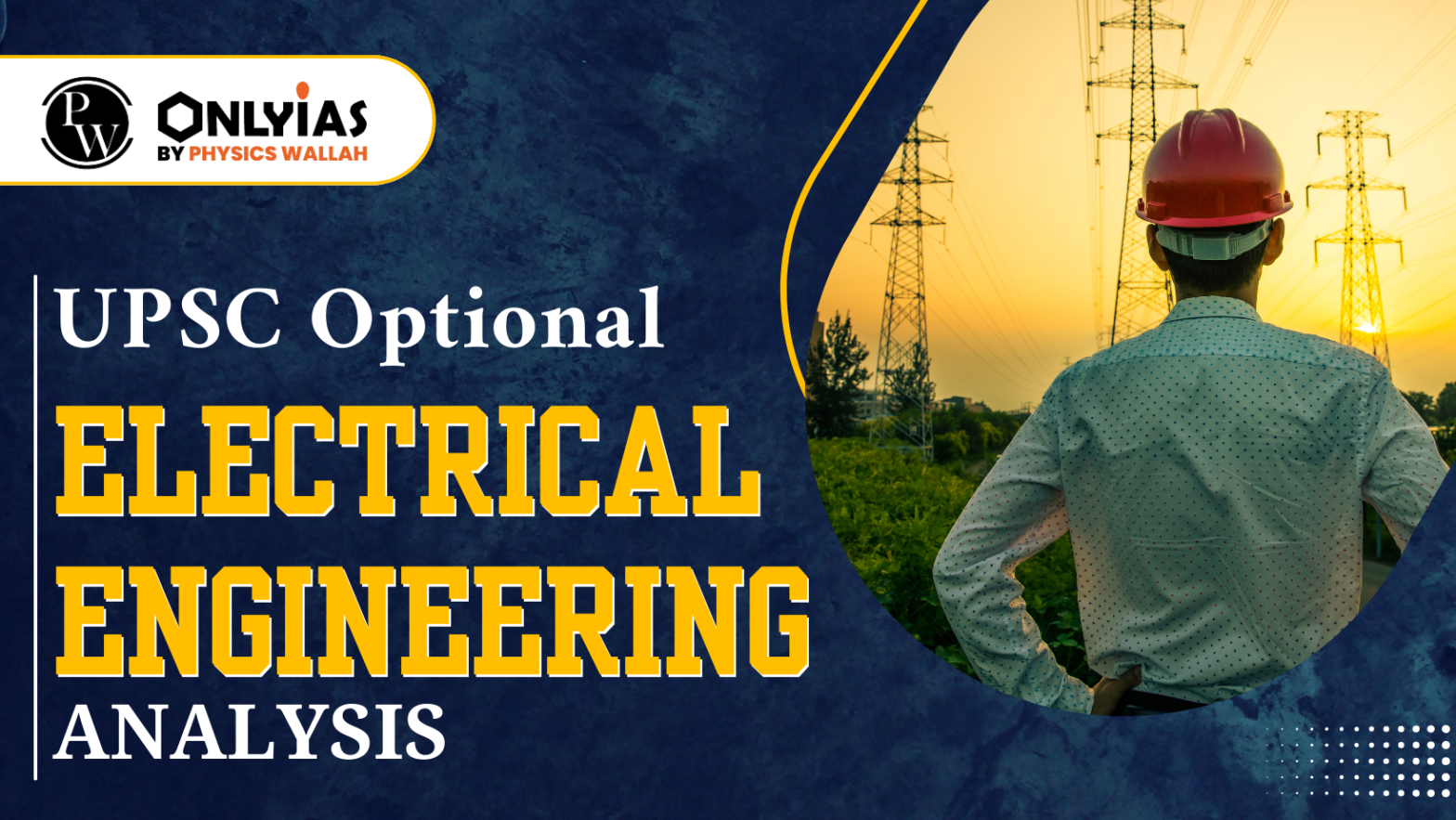UPSC Electrical Engineering Optional Paper consists of 2 papers Paper 1 & Paper 2 carrying 250 marks in each paper. Read more details about UPSC Electrical Engineering Optional Paper, Analysis, Previous Year Papers & Preparation Strategy.

UPSC offers Electrical Engineering as an optional subject for the Civil Service Mains Exam, alongside civil and mechanical engineering. This article explores the advantages of selecting Electrical Engineering as an optional subject and answers key questions about the number of candidates who choose it and successfully pass the exam.
The UPSC Electrical Engineering Optional consists of 2 papers, Paper 1 & Paper 2.
UPSC Mains Optional 2023 will be conducted on 24 September. Live Analysis will be covered once the UPSC Mains exam is conducted.
The UPSC Electrical Engineering Optional Syllabus for Paper 1 encompasses a diverse range of topics, including Circuit Theory, Signals and Systems, Electromagnetic Theory (E.M. Theory), Analog Electronics, Digital Electronics, Energy Conversion, Power Electronics and Electric Drives, and Analog Communication. Given the breadth of these subjects, candidates must devise a well-structured and comprehensive strategy for effective preparation. Studying these topics with a focused plan and dedicated study approach will be pivotal in achieving success in this competitive examination.
The UPSC Electrical Engineering Optional Paper 2 covers vital topics like Control Systems, Microprocessors and Microcomputers, Measurement and Instrumentation, Power Systems, Power System Protection, and Digital Communication. To excel in this section, candidates should focus on solving the previous year’s question papers. By doing so, they can better understand these subjects and improve their problem-solving skills, increasing their chances of success in this UPSC Exam.
Strengthen your grasp of the chosen subject and boost your exam scores with UPSC Electrical Engineering Previous Year Question Papers. We’ve compiled comprehensive UPSC Electrical Engineering Question Papers from previous years, offering you a valuable resource to prepare effectively and succeed in one attempt.
The UPSC Mains Optional Exam for 2023 is set to occur on the 24th of September. This important exam is exclusively for candidates who have successfully cleared the UPSC Prelims. Our aim is to provide valuable insights and information to help candidates perform their best in these papers. Stay tuned with us for real-time updates and expert analysis on the day of the exam.
Strengthen your grasp of the chosen subject and boost your exam scores with UPSC Electrical Engineering Previous Year Question Papers. We’ve compiled comprehensive UPSC Electrical Engineering Question Papers from previous years, offering you a valuable resource to prepare effectively and succeed in one attempt
Understand the Syllabus: To embark on a successful preparation journey, start by gaining a comprehensive understanding of the syllabus. Break it down into specific topics and subtopics to create a clear roadmap for your studies.
Previous Year Papers: Delve into the treasure trove of previous year’s question papers. This practice will not only acquaint you with the exam pattern but also familiarize you with the types of questions that are typically asked in the UPSC Electrical Engineering Optional Paper.
Study Materials: Choosing the right study materials is paramount. Opt for reliable and up-to-date resources, including standard textbooks and reference materials that comprehensively cover the entire syllabus. Ensure that these resources are in line with the latest developments in the field of electrical engineering.
Daily Routine: Establish a disciplined daily study routine. Allocate specific time slots for each subject or topic within the syllabus. Consistency in your daily study habits will help you cover all necessary areas systematically.
Numerical Practice: Pay special attention to numerical practice. Numerical problems are a significant component of the UPSC Electrical Engineering Optional Paper. Regular practice will sharpen your problem-solving skills and boost your confidence in handling these questions.
Test Series: Enrolling in a reputable test series is highly recommended. It not only helps you assess your preparation but also provides a valuable opportunity for exam simulation. Mock tests under timed conditions can simulate the actual exam experience.
Revision: Dedicate time for revision throughout your preparation. Create concise notes and formula sheets for quick reference. This will be invaluable as you approach the exam day.
Stay Updated: Keep yourself updated with the latest developments in the field of electrical engineering. Stay connected with relevant magazines, websites, and current affairs related to the subject matter.
Study Groups: Consider forming or joining study groups with fellow aspirants. These groups can provide a platform for discussing complex topics, clarifying doubts, and gaining diverse perspectives, enhancing your overall understanding of the subject.
Practice Questions: Actively solve previous years’ questions and practice writing answers within the stipulated time limits. This not only aids in content mastery but also hones your time management skills.
Time Management: Effective time management during the exam is crucial. Allocate your time wisely to each section and question to ensure you cover all aspects of the paper.
| UPSC Optional Paper Related Links | |
| UPSC Chemistry Optional Paper | UPSC Civil Engineering Optional Paper |
| UPSC History Optional Paper | UPSC PSIR Optional Paper |
Electrical engineering is a specialized field of study, making it a strong recommendation for graduates with a background in this discipline to consider it as their optional paper choice in the mains exam.
On average, about 100 to 150 candidates choose electrical engineering as their optional subject for the mains exam. In recent years, UPSC has emphasized Control System and Power System, assigning them an average weightage of 85.5 and 82 marks, respectively. The optional subject consists of two papers, each worth 250 marks.

<div class="new-fform">
</div>